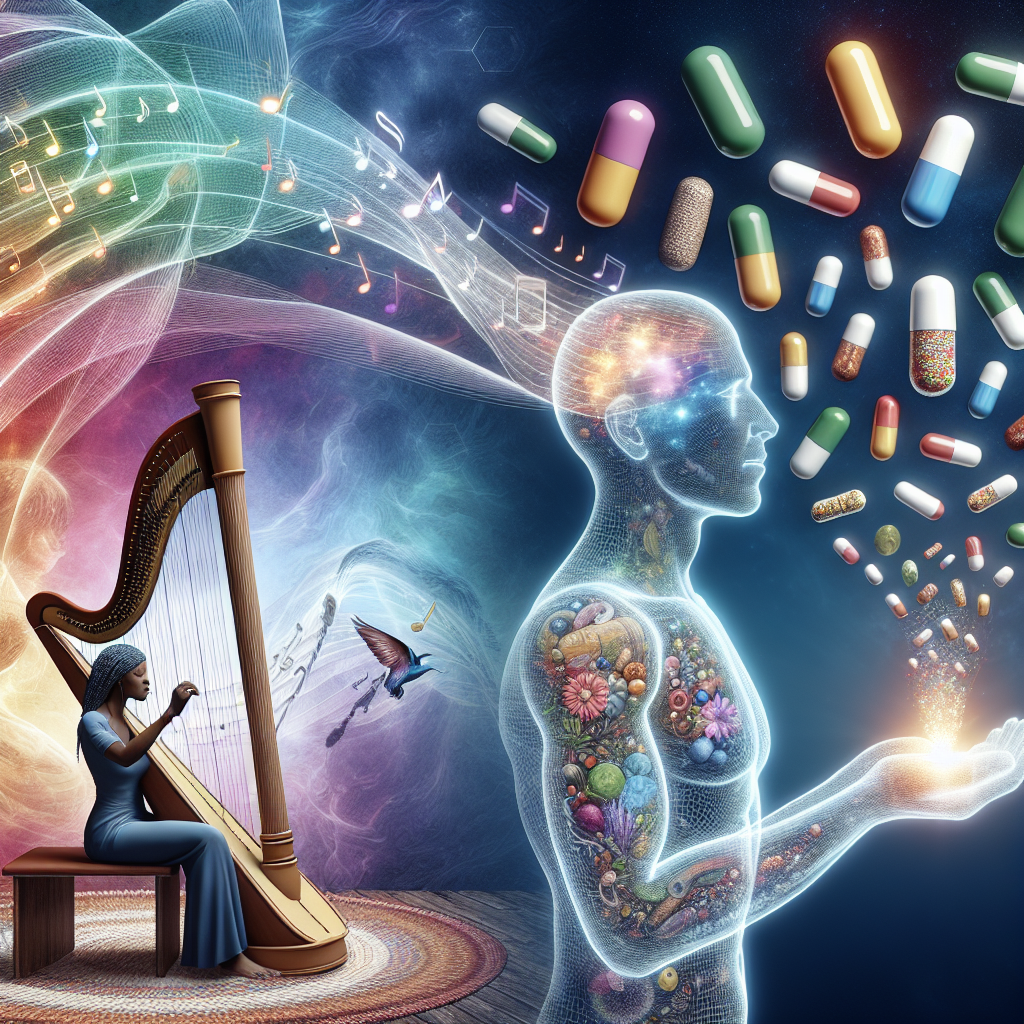How Music Therapy and Vitamins Work Together for Healing

Discover how Music Therapy and Vitamins work together for healing. Uncover the power of this unique combination and how it can enhance your overall well-being. Visit My Vibrant Vitality to learn more.
Exploring the Synergy between Music Therapy and Vitamins for Healing
Music therapy and vitamins, two seemingly disparate elements, have been found to work in synergy to promote healing and overall well-being. This unique combination of sound and nutrition has been gaining traction in the medical community, with numerous studies highlighting the potential benefits of this integrative approach to health and wellness.
Music therapy, a form of expressive arts therapy, involves the use of music to address physical, emotional, cognitive, and social needs of individuals. It can involve listening to music, creating music, or moving to music. The therapeutic benefits of music have been recognized for centuries, with recent research confirming its efficacy in reducing stress, alleviating pain, improving mood, and enhancing cognitive function.
On the other hand, vitamins are essential nutrients that our bodies need in small amounts to work properly and stay healthy. They play crucial roles in various physiological processes, including energy production, immune function, and cellular repair. A deficiency in any vitamin can lead to a range of health problems, while optimal intake can support overall health and well-being.
When combined, music therapy and vitamins can create a powerful healing synergy. Music can stimulate the release of certain chemicals in the brain that promote healing and well-being. For instance, it can trigger the release of dopamine, a neurotransmitter associated with feelings of pleasure and reward. This can help to reduce stress and anxiety, boost mood, and improve overall quality of life.
Meanwhile, vitamins can support the physiological processes that underpin these psychological benefits. For example, B vitamins are essential for the production of neurotransmitters like dopamine. Therefore, adequate intake of these vitamins can enhance the mood-boosting effects of music therapy. Similarly, vitamin C is known for its role in stress management. It helps to reduce the levels of cortisol, a hormone associated with stress. This can complement the stress-reducing effects of music therapy, creating a more potent healing effect.
Moreover, music therapy can enhance the absorption and utilization of vitamins. Research has shown that stress can impair the absorption of nutrients, including vitamins. By reducing stress, music therapy can help to improve nutrient absorption, thereby maximizing the benefits of vitamin intake.
Furthermore, the combination of music therapy and vitamins can support healing on multiple levels. Music therapy can address the emotional and psychological aspects of health, helping individuals to cope with stress, anxiety, and depression. At the same time, vitamins can support physical health by promoting optimal function of various physiological processes.
In conclusion, the synergy between music therapy and vitamins offers a promising approach to healing and wellness. By addressing both the psychological and physiological aspects of health, this integrative approach can promote healing on multiple levels. However, it’s important to note that while music therapy and vitamins can support healing, they should not replace conventional medical treatment. Instead, they should be used as part of a comprehensive approach to health and wellness, under the guidance of a healthcare professional. As research in this area continues to evolve, it’s exciting to imagine the potential benefits that this synergy could offer in the future.
The Role of Music Therapy and Vitamins in Holistic Healing

Music therapy and vitamins, two seemingly disparate elements, have been found to work in harmony to promote holistic healing. This unique combination of sound and nutrition has been gaining traction in the medical community, with a growing body of research supporting its efficacy.
Music therapy, a clinical and evidence-based use of music interventions, has been proven to help individuals improve their physical, emotional, cognitive, and social well-being. It is a versatile form of therapy that can be tailored to the specific needs of each individual. For instance, a person suffering from depression may benefit from music therapy that focuses on uplifting and motivational songs, while someone with anxiety might find solace in calming and soothing melodies.
On the other hand, vitamins play a crucial role in maintaining our overall health. They are essential nutrients that our bodies need to function properly. Each vitamin has a specific role in the body, from boosting the immune system to promoting healthy skin and eyes. For instance, Vitamin C is known for its immune-boosting properties, while Vitamin A is essential for vision and skin health.
When combined, music therapy and vitamins can create a powerful healing synergy. Music therapy can help to reduce stress and anxiety, which in turn can improve the body’s ability to absorb and utilize vitamins. Stress has been shown to negatively impact the body’s nutrient absorption, so by reducing stress through music therapy, we can potentially enhance the effectiveness of vitamins.
Moreover, music therapy can also stimulate the production of certain hormones and neurotransmitters that can enhance the body’s absorption and utilization of vitamins. For instance, music therapy can stimulate the production of serotonin, a neurotransmitter that plays a crucial role in mood regulation and can enhance the absorption of certain vitamins such as Vitamin B6.
Conversely, vitamins can also enhance the effectiveness of music therapy. For instance, certain vitamins such as B vitamins are known to support brain health and cognitive function. By improving brain health, these vitamins can potentially enhance the cognitive benefits of music therapy, such as improved memory and concentration.
Furthermore, vitamins can also support the physical health benefits of music therapy. For instance, Vitamin D is known to support bone health. Music therapy often involves physical activities such as dancing or playing musical instruments, which can help to improve physical strength and coordination. By supporting bone health, Vitamin D can potentially enhance these physical benefits of music therapy.
In conclusion, music therapy and vitamins can work together to promote holistic healing. Music therapy can help to reduce stress and stimulate the production of certain hormones and neurotransmitters, which can enhance the body’s absorption and utilization of vitamins. Conversely, vitamins can enhance the cognitive and physical benefits of music therapy. This unique combination of sound and nutrition offers a promising approach to holistic healing, providing a testament to the power of integrative medicine.
Unveiling the Healing Power of Music Therapy and Vitamins
Unveiling the healing power of music therapy and vitamins is a fascinating exploration into the realm of holistic health. The integration of these two seemingly disparate elements can create a potent combination that promotes healing and overall well-being.
Music therapy, a form of expressive therapy, uses music to improve and maintain the physical, psychological, and social well-being of individuals. It involves a range of activities, from listening to music and playing a musical instrument to singing and composing music. The therapeutic benefits of music have been recognized for centuries, with its ability to evoke emotions and memories, reduce stress, and promote relaxation.
On the other hand, vitamins are essential nutrients that our bodies need in small amounts to work properly. They play a crucial role in maintaining good health and preventing diseases. Each vitamin has specific jobs, from boosting the immune system and aiding the body to use the energy from food to keeping the skin, eyes, and nervous system healthy.
When music therapy and vitamins are combined, they can work together to enhance the healing process. Music therapy can help to reduce stress and anxiety, improve mood, and promote relaxation, which can, in turn, enhance the body’s ability to absorb and utilize vitamins. When the body is relaxed and stress-free, it is more efficient at absorbing nutrients from food and supplements, including vitamins.
Moreover, certain vitamins, such as B vitamins, are known to support the nervous system and help the body cope with stress. When combined with music therapy, these vitamins can help to further reduce stress and anxiety, enhance mood, and promote a sense of calm and relaxation.
Music therapy can also help to stimulate appetite in individuals who have lost their appetite due to illness or treatment. This can help to ensure that they consume a balanced diet that provides all the necessary vitamins and other nutrients.
Furthermore, music therapy can help to improve sleep quality. Good sleep is essential for the body to repair and regenerate itself, and it is during sleep that the body absorbs most of the vitamins and other nutrients from food. Therefore, by improving sleep quality, music therapy can help to enhance the body’s absorption of vitamins.
In addition, music therapy can help to boost the immune system. Research has shown that listening to music can increase the production of antibodies and activate certain immune cells. This, combined with the immune-boosting properties of certain vitamins, such as vitamin C and vitamin D, can help to enhance the body’s immune response and promote healing.
In conclusion, the combination of music therapy and vitamins can provide a powerful tool for healing and overall well-being. Music therapy can help to reduce stress and anxiety, improve mood, stimulate appetite, improve sleep quality, and boost the immune system. Meanwhile, vitamins can support these effects by enhancing the body’s ability to cope with stress, supporting the nervous system, boosting the immune system, and aiding the body’s absorption of nutrients. Therefore, by working together, music therapy and vitamins can enhance the healing process and promote overall health and well-being.